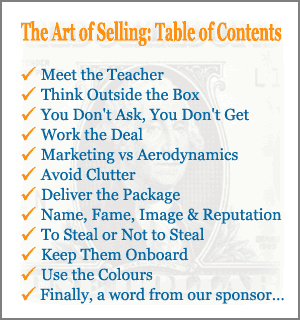
|
|

The Art of Selling: Sponsorship 101
|
|
|
By David Cameron, Italy
Atlas F1 Magazine Writer
|
 Table of Contents includes links to each chapter
Table of Contents includes links to each chapter
|
|
Most sponsorship deals are initiated in-house, with the team doing their research and then making a pitch to the company they decided on. If you don't ask, you don't get. The initial research is demanding and time consuming, but there is no better way of preparing for the approach.
"Yeah, it's reading the Financial Times, marketing publications… and the web is obviously now a fantastic tool, because any company you can think of that might be interested, if you read that such and such a company might be interested in promoting its product on a global basis you can instantly jump on the web and you've got a handle on who this company is. You've also been able to work out if there are any clashes with any of your existing sponsors, and it even tells you who to make an approach to - the World Wide Web was a godsend to sponsorship seekers. "We have to also deal with agencies; we don't have any exclusive arrangements with agencies - never have done, never will. There are literally a handful of agencies who we deal with on a regular basis, but you have to be careful because one, you have to pay a commission on an agency introduction and we don't like paying commissions, and secondly you are at the mercy of the agency because obviously the agency wants to make as much money as possible.
One of the problems with sponsorship agents is that there are so many of them, and some may not be all they appear to be. "There's quite a few [agents], but there's not many who have actually done deals. "It's interesting because BusinessF1 did a review of sponsorship agents, and if you read that at least three agencies there claim to have got the Compaq deal for us, and yet we don't pay, and never have paid, a single penny in commission to any agency for the Compaq / HP deal. So work that out. So what I'm saying to you is that there are many people who claim to be involved in Formula One sponsorship, and claim to have links with this sponsor or that sponsor - in reality I think very few of them do." Moreover, in-house approaches or sponsorship agencies are the way to go for deals; the days of a company making a cold approach to a team are pretty much over. "Do companies ring us up and say they want to sponsor us? A few, but they tend to be companies who either don't know really what it costs to sponsor in Formula One these days, or they're companies who you probably wouldn't want to be associated with. The sponsors that you see here" - Wright indicates towards the sponsors logos on the wall of the Williams motorhome - "there's not one of those who rang us up and said 'we want to sponsor you'." Moreover, in all forms of sales the potential for having a proposal refused is high - salesmen have to develop a notoriously thick skin to survive in the business. Marketers are salesman with a different product, and the risk remains, but Wright suggests there are ways to negotiate a no. "I think because we're experienced, and the sales group is a very talented and experience group of people. They wouldn't have a machine gun effect - they wouldn't just pump out dozens and dozens of sponsorship proposals each week - it's more a rifle effect. "But I have to say that at least 80% of your proposals that go out would initially be [answered with a] no - certainly initially. But you'd expect that, I think; I think in any form of sales, no matter what you're selling, it's 80% or more. We've never sort of measured it. You get a feel for what's right and what's going to fly, you develop a nose for it - it's a bit like Inspector Morse, who has a nose for 'this guy did it', and he goes to his boss and he'll say 'where's the evidence, Morse?' And he never had that evidence but he had a nose for it, and then he'll work on finding that evidence. And we're a little bit like that, in that we have a nose for it. "Allianz is a good example: the guys had a nose for it being right for Allianz, the timing was right, they needed international expansion, and they said 'no' but they kept working on it until they said 'yes'. And I think that's the case - they felt we were going to crack this company and they kept working on it, and that's exactly what happened. So I think you have to develop that, and you develop that in your targeting and therefore your approaches, and if you do that then the waste or the chances of a rebuffal become smaller." © 1995-2005 Kaizar.Com, Inc.
. This service is provided under the Atlas F1 terms and conditions.
Please Contact Us for permission to republish this or any other material from Atlas F1. |
|